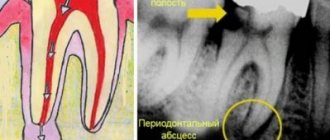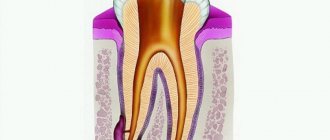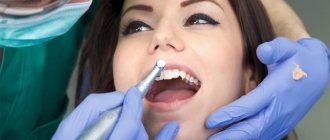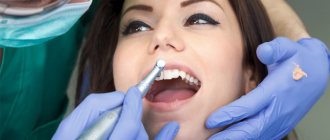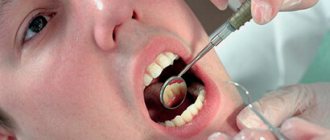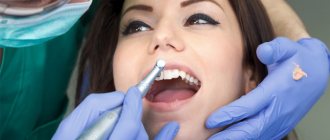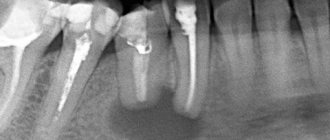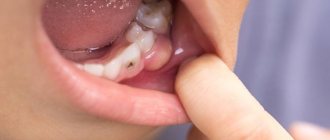When deletion is indicated
Modern dentistry strives to preserve teeth and their roots whenever possible, but this is not always possible. Dental surgeons remove teeth with cysts for the following indications:
- the infectious process was caused by an advanced form of periodontal disease;
- there is a vertically located crack on the root of the tooth or on itself;
- the dental root canals are impassable, as a result of which therapeutic treatment becomes impossible;
- severe tooth decay, and restoring it does not make sense (too expensive and time-consuming);
- the tooth is located entirely in the cavity of the neoplasm;
- the cyst has grown into the nasal cavity, or the size of the tumor is more than 10 mm;
- the root of the tooth has fused with the neoplasm;
- the tooth is very loose.
The dentist decides to remove a tooth with a cyst after a thorough examination of the patient, which includes examination, history taking, radiography or visiography.
Reasons for appearance
The causes of a cyst can be very diverse, ranging from infection getting inside the canal to an unfortunate injury to a tooth or jaw.
Causes:
- tooth injury;
- due to infection entering the root canal as a result of poor quality treatment;
- as a result of unfair endodontic treatment;
- due to a previous disease in which pathogenic bacteria entered the gums along with the bloodstream;
- as a complication of chronic sinusitis;
- the presence of chronic inflammatory processes under the crown;
- as a result of the patient having chronic periodontitis;
- after difficult eruption of wisdom teeth.
However, despite the rather impressive list of reasons, in fact they all come down to two main ones - infection of the root canals and injury to the tooth or jaw. Therefore, situations where injury may occur should be avoided. For example, you should not crack nut shells, since frequent microtrauma can also trigger the formation of a cyst. Entrust the treatment of your teeth only to experienced professionals, so as not to become a victim of poor-quality treatment, as a result of which an infection has penetrated into the root canals, causing an inflammatory process, which over time can lead to disease.
Removing a tooth with a cyst: does it hurt or not?
In the “Optimal Choice” dental clinics, when removing teeth with benign formations at the roots, the latest anesthetics and modern equipment are used. Therefore, patients do not need to be afraid of anything at all. The doctor selects anesthetics on an individual basis; in some cases, general anesthesia may be recommended (we do not use it). Minor pain may occur after tooth extraction, when the anesthesia wears off. To relieve pain, your doctor may prescribe painkillers.
Types of deletion
A dental cyst can be treated using one of the following surgical methods:
- Cystectomy is the most common way to remove cysts on teeth. During this operation, an incision is made on the gum, through which both the benign neoplasm and the apex of the tooth root with pathology are removed. The cystectomy procedure is usually performed under local anesthesia, after which the doctor prescribes antibiotics to the patient.
- Hemisection - this type of removal is used if a tooth with a cyst has more than one root, and at least one of them is pathologically changed. During this procedure, the cystic formation, the root of the tooth with pathology, and part of the tooth itself are removed. After this operation, a crown is placed on the tooth.
- Cystotomy is the most gentle type of surgical treatment for dental cysts, in which the doctor removes only the front wall of the tumor. The tooth body is completely preserved.
These techniques are an alternative to the complete removal of teeth with cysts. But it is not always possible to apply them. To completely remove teeth with benign tumors, the extraction method is used. The operation can be performed urgently or planned.
Preoperative preparation
During the operation, it is necessary to resect not only the root of the tooth in which the cyst has developed, but also the roots of neighboring teeth, which is why it is necessary to treat them in advance - filling the root canals. As a rule, this happens 2-5 days before the cystectomy. The patient may also be asked to undergo additional examination by visiting the offices of a therapist, cardiologist, etc. The patient will find out exactly what additional examinations are needed in each specific case only at the appointment.
What are the stages of the operation?
The procedure consists of the following steps:
- The desired area is numbed using conduction or infiltration anesthesia.
- The gum is peeled off from the wall using a rasp.
- The tooth is loosened and removed using forceps or an elevator.
- The dental unit is removed from the socket. In difficult cases, the tooth is first sawed into pieces using a drill, and then each of them is removed separately.
- The extracted tooth and socket are examined by a doctor.
- The cyst cavity is cleaned, and the wound is treated with antiseptic drugs.
- The wound is stitched up.
- Using an X-ray examination, the doctor makes sure that fragments, particles of the tooth and the removed tumor do not remain in the jaw.
- Antibiotics, anti-inflammatory drugs and anesthetics are prescribed.
Two to three days after the operation, you need to re-visit your dentist to monitor the condition of the tooth socket.
How do you know whether to treat or remove?
To make a decision on the method of treating the cyst and, in general, on the advisability of carrying out tooth-preserving measures, we first send the patient for a consultation, which is carried out by two specialists at once - an endodontist and a surgeon . After collecting all the necessary information and analyzing the images, a detailed clinical picture is drawn up and, together with the patient, the advisability of endodontic or surgical treatment is discussed.
When deciding on the “fate” of a tooth, a lot of factors are taken into account:
Education size
According to our treatment algorithm, it is first necessary to establish the exact dimensions of the area of inflammation at the root apex in order to make the correct diagnosis, calculate the estimate, number and sequence of procedures.
- The size of the formation is less than 5 mm - amenable to non-surgical therapeutic treatment.
- More than 5 mm in diameter - surgical removal of the cyst and correction of the root apex will most likely be required.
Root canal condition
Single-rooted teeth, easily passable canals, and undeveloped situations are treated cheaper and faster. Four-rooted teeth previously treated with the resorcinol-formalin method, perforations and cracks in the teeth that pose a threat to your health and budget are discussed in detail and individually before starting treatment.
Degree of coronal destruction
If a tooth is severely damaged, especially if the damage is below the gum level, it is worth thinking about the advisability of tooth-preserving measures. Even after ideal canal treatment, it will not be possible to recreate the shape of the tooth either with composite restoration or orthopedic structures. This means that all endodontic treatment will be reduced to zero, since there will be no reliable protection of the canals from above.
Localization of the cyst
The position of the cyst relative to arteries, veins, nerve fibers, as well as neighboring teeth is taken into account. It is not uncommon for detailed examination and treatment planning to reveal cysts growing into adjacent living teeth. In such cases, it is necessary to recheck the scope of work many times to prevent recurrence of cysts from neighboring areas. This is especially true for cases of follicular cysts (appearing from the growth zones of developing and growing “wisdom teeth”).
We
fight for every tooth - if there is even the slightest chance of saving it.
The specialists of our Center will be happy to save a tooth in any hopeless situation. We provide a lifetime guarantee for the treatment of cysts . However, sometimes the rescue budget is comparable to the implantation budget, which is achieved with much less effort and also with a lifetime guarantee. Let us make this important decision for you.
Levin Dmitry Valerievich Chief physician and founder of the Doctor Levin center
Possible complications
Among the common consequences of removing a tooth with a cyst may be the following complications:
- slight increase in body temperature;
- migraine;
- soft tissue swelling;
- toothache.
In order to alleviate the patient's condition, symptomatic treatment is prescribed.
If the doctor is insufficiently qualified or the patient does not comply with medical recommendations, the following complications may arise as a result of surgical intervention:
- infectious process in tissues;
- injury to nerve endings;
- profuse bleeding.
To avoid this, you must contact only trusted dentists with good experience and clinics with modern equipment, and also follow all recommendations given by your doctor.
Why don't we treat cysts with laser?
Laser treatment of dental canals is nothing more than a marketing ploy. When analyzing long-term results, it turned out that the positive disinfecting effect of the laser is seriously compromised and has a weak antiseptic advantage.
- It is impossible to pass through tortuous channels with a laser, since the light guide is a beam that is directed strictly straight and does not process sections of the channel after bending.
- The high-temperature effect of the laser beam forms tissue burn areas, causing inhibition of their recovery and prolongation of treatment time.
We abandoned this technique because we cannot guarantee the success of treatment in the long term.
Preventive measures
To ensure tissue healing proceeds faster and serious complications do not arise, a number of recommendations must be followed. Dentists at the Optimal Choice clinic give the following advice to their patients:
- For several days after surgery, rest is required; any physical activity (even light) is contraindicated;
- avoid hot water procedures, including baths, steam baths, saunas, and do not use hot compresses;
- You cannot use active mouth rinses for 2-3 days; if necessary, they can be replaced with oral baths with infusions or decoctions of medicinal herbs (with oak bark, calendula, eucalyptus, sage), furatsilin, chlorhexidine, etc.;
- do not drink alcoholic beverages or smoke for 2-3 days;
- Taking medications prescribed by a doctor is mandatory.
Compliance with these rules, as well as regular visits to the dentist for preventive examinations and at the slightest unpleasant symptoms, will allow you to avoid serious negative consequences and significant financial expenses for dental services.
Recovery period after surgery. Basic recommendations
In the postoperative period, in addition to the basic doctor’s instructions and systematic examination, you should follow the following rules:
- Refrain from eating solid foods for at least a month - nuts, candies, etc.;
- Carefully monitor oral hygiene;
- On the first day you should refrain from eating hot food and drinks;
- Try to reduce the chewing load for at least 1 month;
- After every meal you need to rinse your mouth.
As a rule, if all recommendations are followed, in most patients the healing period of the hole does not exceed 2-2.5 weeks.
Experts' opinion
Question: Is it possible to avoid the occurrence of a cyst on a tooth?
Answer : The etiology of the formation of a cyst at the root of a tooth can be different. At the initial stages, treatment of this pathology does not pose a serious problem. Therefore, it is very important to be regularly examined by a dentist, and also to take x-rays or visiography at least once a year to identify any pathologies of the dental system. New growths, if present, will also be visible on the images. To reduce the likelihood of tumors appearing, if any diseases of the oral cavity and nasopharynx occur, it is necessary to treat them in a timely manner: develop the habit of regularly rinsing your mouth with antiseptics, and learn to brush your teeth correctly. Maintaining a healthy lifestyle, a balanced diet, a strong immune system and preventive dental examinations are the key to dental health.
Question: Is it possible to get rid of a cyst on a tooth at home on your own?
Answer : We do not recommend self-medication if you have any pain or unpleasant symptoms in the oral cavity. Any discomfort may be a sign of a serious illness that requires medical attention. If it is not possible to urgently visit the dentist, then to reduce pain you can use the following rinses: herbal decoctions (yarrow, calendula, sage, chamomile, oak bark), a solution of baking soda or salt, vodka, tea tree essential oil. This may help reduce pain, but in any case you should see a doctor as soon as possible.
What is the difference between a cyst and a granuloma?
A dental cyst is often confused with a granuloma, another dangerous disease in which a round-shaped formation forms in the root area. It is important to distinguish between them, since the diagnosis directly affects the treatment plan and its prognosis. For granuloma, in most cases therapeutic treatment is sufficient. But a cyst requires more radical measures.
Here are the main parameters by which a dental cyst and a dental granuloma differ:
| Difference options | Cyst | Granuloma |
| Size | 0.9 - 3 cm | 0.5 - 0.8 cm |
| Structure | Cavity with fluid or pus | Solid formation covered with connective tissue |
| Clinical picture | The tooth becomes mobile | No mobility observed |
| X-ray result | The image shows a round capsule with clear boundaries | There are no strict outlines of education |
| Condition of periodontal tissues | The mucous membrane is usually not inflamed. In this case, bone loss occurs. | There is severe swelling and redness of the mucous membrane. But bone tissue does not decrease so much that it can be detected clinically. |
